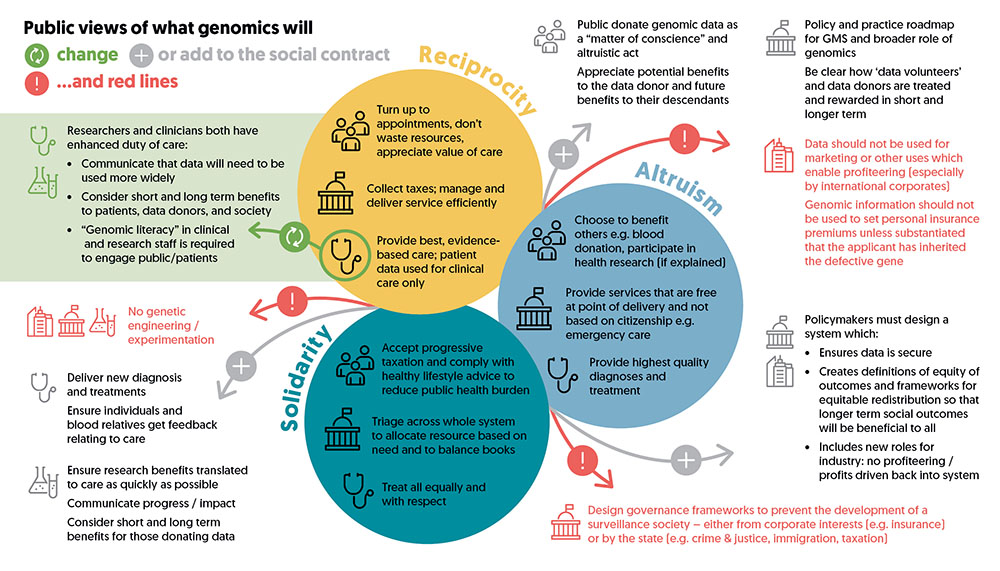A public dialogue on genomic medicine: time for a new social contract?
A new Ipsos report: ‘A public dialogue on genomic medicine: time for a new social contract?’ explored public aspirations, concerns, and expectations about the development of genomic medicine in the UK. It was commissioned by Genomics England and co-funded by UK Research and Innovation’s Sciencewise programme in support of public dialogue on scientific and technological issues.
The dialogue found that advances in genomic medicine may change public expectations around donating their data; and that clinicians and researchers will need to be equipped with ‘genomic literacy’ to support patients and donors and explain the ever-closer relationship between research and clinical care. The ways that medical charities, research organisations, and industry work with the NHS, and the importance of basic biological research, will also need to be better explained.
The NHS was founded on a common set of principles and values, as outlined in the NHS Constitution, that bind together patients, the public and NHS staff, helping the service work in an effective and equitable way.
The genomics dialogue revealed that although participants were unfamiliar with the terminology around this ‘social contract’, they had very clear perceptions of how the NHS works and the ‘contract’ between the service and patients.
The report recommends that the core principles of the genomics social contact – reciprocity, altruism, and solidarity – should be enshrined in the NHS Constitution.
The project also found that whilst there was widespread enthusiasm and support for genomic medicine, the public also have clear limits (red lines) for how far they thought genomic data, and information derived from it, should be used. Participants wanted assurances that there is a robust governance framework and consent process in place that makes it clear what the intended use of their data is.

Technical note:
- Ninety-seven members of the public, and thirty experts came to evening and reconvened day-long Saturday events, held in Coventry, Edinburgh, Leeds, and London.
- A proportion of each group in each location was reconvened to a final Genomics summit event in London (n=23 in total), where the group was again joined by experts.
- A total of forty-three experts attended the dialogue workshops and the Genomics summit.
- A rapid light-touch literature review was conducted to inform the dialogue materials and to ensure that the project built on the work of previous social research on attitudes to genomics. A stakeholder workshop including 19 participants also helped shape the framing of the dialogue, the materials and examples given to workshop participants.
- The dialogue method involves in-depth discussion with relatively small groups of people; participant views are therefore not representative of the views of the wider public in the same way as a large scale survey. Nevertheless, the depth of discussion, time for reflection, scope of information provided, and interaction with experts, means that the views expressed here can be taken as a good indication of how an informed public might respond to complex ethical and practical questions around genomics.






